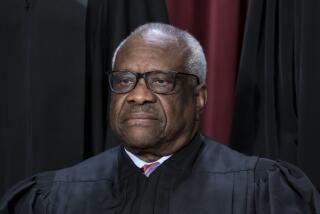Senators Inquire of Justices’ Recusal Rules
- Share via
WASHINGTON — Two Senate Democrats asked Chief Justice William H. Rehnquist on Thursday what rules the justices follow in deciding whether they should remove themselves from consideration of a case before the Supreme Court.
A letter from Sens. Patrick J. Leahy of Vermont and Joe Lieberman of Connecticut was prepared in response to a report in The Times on Saturday that Justice Antonin Scalia and Vice President Dick Cheney had gone duck hunting together in southern Louisiana three weeks after the high court agreed to hear Cheney’s appeal of a judge’s order that he produce documents about meetings of his task force on U.S. energy policy.
“When a sitting judge, poised to hear a case involving a particular litigant, goes on a vacation with that litigant, reasonable people will question whether that judge can be a fair and impartial adjudicator of that man’s case or his opponent’s claims,” wrote Leahy, the ranking Democrat on the Judiciary Committee, and Lieberman, the ranking Democrat on the Governmental Affairs Committee.
“In this particular case, Vice President Cheney is a named party and a material witness to the events at issue in the lawsuit the Supreme Court has agreed to hear,” they said.
Two groups, the Sierra Club and Judicial Watch, sued Cheney after he refused to reveal who met with his energy task force early in 2001. They contended that Cheney violated an open-government measure, the Federal Advisory Committee Act.
A federal District Court judge ordered Cheney to turn over documents detailing who had participated in the work of the task force. The vice president refused and appealed. After the U.S. Court of Appeals in Washington upheld the judge’s order, U.S. Solicitor General Theodore B. Olson filed an appeal at the Supreme Court in September.
After discussing the matter, the high court announced Dec. 15 that it would hear the case of “in re Richard B. Cheney.”
The two senators asked the chief justice what “canons, procedures and rules are in place” to determine when and under what circumstances a justice should step aside.
Federal law says a “justice [or] judge shall disqualify himself in any proceeding in which his impartiality might reasonably be questioned.” But the law does not spell out in detail what triggers a disqualification.
In a written response to initial questions about the trip, Scalia said last week that members of the high court often meet other senior government officials in social settings. Moreover, those officials -- because of their positions -- are often named in lawsuits, he added.
“I do not think my impartiality could reasonably be questioned” in Cheney’s case, Scalia wrote.
Leahy and Lieberman questioned Scalia’s assessment and asked “whether mechanisms exist ... for review of a justice’s unilateral decision to decline to recuse himself.”
In the lower courts, litigants may appeal to a higher court if a judge refuses to recuse himself in a case where a conflict of interest seems apparent. At the Supreme Court, however, each justice determines whether he or she should step aside.
Last fall, Scalia announced that he was withdrawing from a pending case on the Pledge of Allegiance because he had spoken publicly about the issue a few months before.
The two senators also asked about media reports from Louisiana that Scalia arrived on a private jet. “We would like to know whether the Supreme Court has given any guidance to its members about the propriety of, and any conditions for, accepting access to private jets for travel to extrajudicial activities,” they wrote.
Kathleen Arberg, the Supreme Court’s spokeswoman, said she had no comment on the letter, which was sent late Thursday.
More to Read
Get the L.A. Times Politics newsletter
Deeply reported insights into legislation, politics and policy from Sacramento, Washington and beyond. In your inbox three times per week.
You may occasionally receive promotional content from the Los Angeles Times.











